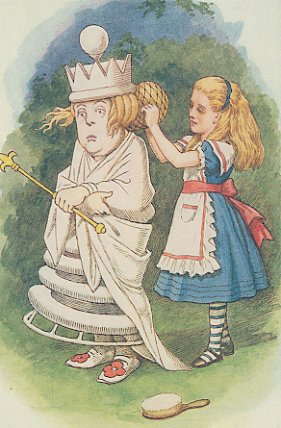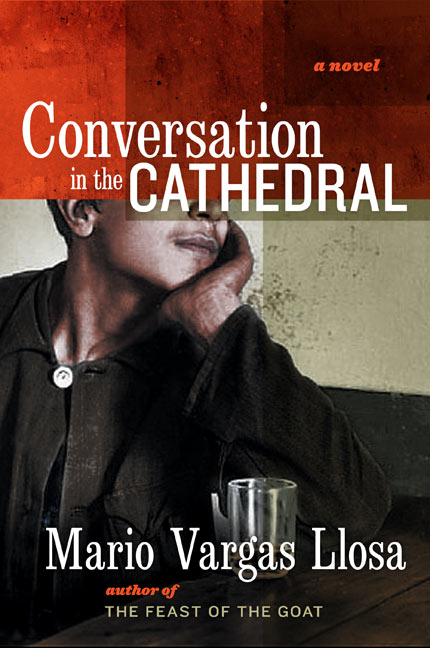You will hear everlastingly, in all discussions about newspapers, companies, aristocracies, or party politics, this argument that the rich man cannot be bribed. The fact is, of course, that the rich man is bribed; he has been bribed already. That is why he is a rich man. The whole case for Christianity is that a man who is dependent upon the luxuries of this life is a corrupt man, spiritually corrupt, politically corrupt, financially corrupt. There is one thing that Christ and all the Christian saints have said with a sort of savage monotony. They have said simply that to be rich is to be in peculiar danger of moral wreck. It is not demonstrably un-Christian to kill the rich as violators of definable justice. It is not demonstrably un-Christian to crown the rich as convenient rulers of society. It is not certainly un-Christian to rebel against the rich or to submit to the rich. But it is quite certainly un-Christian to trust the rich, to regard the rich as more morally safe than the poor. A Christian may consistently say, “I respect that man’s rank, although he takes bribes.” But a Christian cannot say, as all modern men are saying at lunch and breakfast, “a man of that rank would not take bribes.” For it is a part of Christian dogma that any man in any rank may take bribes.—G. K. Chesterton, Orthodoxy
Monthly Archives: February 2014
Getting the Joke 55 Years Later
I was a mere fourteen years old, a Freshman in Latin 1 at Chanel High School in Bedford, Ohio. My instructor was the Rev. Seamus MacEnri, S.M., from Dungannon, County Tyrone, Northern Ireland. One day, he archly drew the following on the chalkboard:
Jam tomorrow, jam yesterday, but never jam today
Our reaction was a uniform, “Whaaa?” But then, we were all a bunch of hayseed kids from the southeastern suburbs of Cleveland and didn’t have Father MacEnri’s breadth of experience. It took quite a while before the whole joke became clear to me. Today, in this post, I will analyze the joke, effectively forestalling any laughter or snickers.
First, let’s take a look at this from Lewis Carroll’s Through the Looking Glass:
“I’m sure I’ll take you with pleasure!” the [White] Queen said. “Two pence a week, and jam every other day.”
Alice couldn’t help laughing, as she said, “I don’t want you to hire me – and I don’t care for jam.”
“It’s very good jam,” said the Queen.
“Well, I don’t want any to-day, at any rate.”
“You couldn’t have it if you did want it,” the Queen said. “The rule is, jam to-morrow and jam yesterday – but never jam to-day.”
“It must come sometimes to ‘jam to-day’,” Alice objected.
“No, it can’t,” said the Queen. “It’s jam every other day: to-day isn’t any other day, you know.”
“I don’t understand you,” said Alice. “It’s dreadfully confusing!”
And so were we all confused. Now, why would a teacher of Latin spring this rather arcane joke on a bunch of high school freshmen. It took a while to swirl around in my mind before I got the picture. It all comes down to something that Medieval copyists started doing in the 13th century:
Sometimes one will see a “j” in Latin. Technically Latin has no letter J. It was introduced in the 13th century or thereabouts to differentiate between the vowel i and the consonant i. The consonantal i is like our y. “Major” in Latin is pronounced as MAH-yor. Until this last century, most printed Latin texts used the j to indicate the different sounds. Today the j’s are usually replaced with the more classical i’s.
That’s why we have words like juvenile and justice, which come from the Latin iuvenilis and iustitia respectively.
Now, what does jam—or should I say iam?—mean in Latin? It means nothing less than now. Jam tomorrow, jam yesterday, but never jam now.
Well, Father MacEnri, I finally got the joke—and damned near killed it, too.
Front Lawns and Drought
There is something wrong with our obsession with front lawns. Other than serving to set back a house a little further from the noise of the street, what purpose does it serve? Kids don’t play on front lawns so much as they do with back yard lawns. (Actually, in this era of video games, they are not likely to play outside at all.) Yet it seems that manicuring a front lawn is one of the badges of middle class life in the suburbs.
We are now experiencing a terrible drought in California, probably the worst in recent history. Although we are now between rainstorms after receiving a good drenching last night, we are so far from normal that March would have to be the wettest on record to move the water gauge any appreciable amount. Perhaps now is the time to consider front yards that are more in line with the flora of our tropical savanna climate, such as succulents and other xerophytic plants that typically grow in desert regions. As a simple matter of aesthetics, I don’t see why a green lawn such as the one shown above is preferable to a mix of desert plants, which can be quite beautiful, especially when they flower.
Please note that my comments are directed more to the apparently decreasing rainfall of the American Southwest than to other parts of the country, where desertification is less of an issue. If you are currently under water, feel free to sow those grass seeds wherever you can.
Tarnmoor’s ABCs: Dartmouth College
It was a beautiful place to spend four years, even if I had never really been more than a few miles away from home by myself before then. I went from being a valedictorian who had won all the non-sports-related honors at Chanel High School to one of hundreds of similar people from all around the country, including those famous prep schools that have sprouted up over all of New England.
At that time, Dartmouth College was isolated by the fact that the Interstate Highway system had not yet made its way into New Hampshire and Vermont. Today, Hanover, New Hampshire, is less than two hours from Boston via I-89. During the months of January and February, we were at times cut off from all supplies until the snow plows could cut a channel for cars and trucks. All four years, I stayed in Middle Wigwam Hall, which was later renamed to McLane Hall. My dorm stood a mile from the center of campus. To get to class, I had to trudge past the eerie old Hanover cemetery, with its tombs dating back to the Eighteenth Century, often on a sidewalk that had obligingly turned into a sheet of ice.
During those years, I suffered frequently from severe frontal headaches, which were the result of a pituitary tumor (chromophobe adenoma) pressing on my optic nerve. The attacks occurred on 50% of all days, with the “penumbra” of the headache beginning around 11 am and reaching a crescendo around midnight. That’s why I did most of my homework before midnight and 3 am. It was not until after I graduated that I was properly diagnosed: Until then, doctors did not know what to think—especially since MRIs and CT Scans had not yet been invented.
Pain and all, I loved Dartmouth. The quality of the instructors was, for the most part, incredibly high. Particularly in the English department, I had a succession of professors I will never forget: men like Chauncey Loomis, Peter Bien, and Thomas Vance.
At first, I hoped to become an English professor, until the movies turned by head. The Dartmouth Film Society screened great films, including a huge year-round Alfred Hitchcock festival. Plus I made the acquaintance of Arthur L. Mayer, the former “Merchant of Menace” from New York’s Rialto Theater and the author of Merely Colossal (1953). It was while at Dartmouth that I decided to go to graduate school in film history and criticism at UCLA—and that’s how I wound up in La La Land.
Dartmouth College had been founded as a missionary school for Indians in 1769 under the patronage of the Earl of Dartmouth. In 1819, the school made legal history when Daniel Webster argued before the Supreme Court in Trustees of Dartmouth College vs. Woodward, better known as the Dartmouth College Case. President Franklin “Handsome Frank” Pierce graduated from there and went on to become one of the most mediocre presidents in U.S. history.
I will leave you with the official seal of Dartmouth:
The motto was most appropriate considering the school’s winter isolation.
G. K. Chesterton vs Conservatism
We have remarked that one reason offered for being a progressive is that things naturally tend to grow better. But the only real reason for being a progressive is that things naturally tend to grow worse. The corruption in things is not only the best argument for being progressive; it is also the only argument against being conservative. The conservative theory would really be quite sweeping and unanswerable if it were not for this one fact. But all conservatism is based upon the idea that if you leave things alone you leave them as they are. But you do not. If you leave a thing alone you leave it to a torrent of change. If you leave a white post alone it will soon be a black post. If you particularly want it to be white you must be always painting it again; that is, you must be always having a revolution. Briefly, if you want the old white post you must have a new white post. But this which is true even of inanimate things is in a quite special and terrible sense true of all human things. An almost unnatural vigilance is really required of the citizen because of the horrible rapidity with which human institutions grow old. It is the custom in passing romance and journalism to talk of men suffering under old tyrannies. But, as a fact, men have almost always suffered under new tyrannies; under tyrannies that had been public liberties hardly twenty years before. Thus England went mad with joy over the patriotic monarchy of Elizabeth; and then (almost immediately afterwards) went mad with rage in the trap of the tyranny of Charles the First. So, again, in France the monarchy became intolerable, not just after it had been tolerated, but just after it had been adored. The son of Louis the well-beloved was Louis the guillotined. So in the same way in England in the nineteenth century the Radical manufacturer was entirely trusted as a mere tribune of the people, until suddenly we heard the cry of the Socialist that he was a tyrant eating the people like bread. So again, we have almost up to the last instant trusted the newspapers as organs of public opinion. Just recently some of us have seen (not slowly, but with a start) that they are obviously nothing of the kind. They are, by the nature of the case, the hobbies of a few rich men. We have not any need to rebel against antiquity; we have to rebel against novelty. It is the new rulers, the capitalist or the editor, who really hold up the modern world. There is no fear that a modern king will attempt to override the constitution; it is more likely that he will ignore the constitution and work behind its back; he will take no advantage of his kingly power; it is more likely that he will take advantage of his kingly powerlessness, of the fact that he is free from criticism and publicity. For the king is the most private person of our time. It will not be necessary for any one to fight again against the proposal of a censorship of the press. We do not need a censorship of the press. We have a censorship by the press.—G. K. Chesterton, Orthodoxy
Tarnmoor’s Iron-Clad Rule #1: Ecology
This is the start of a new series on what I perceive to be iron-clad rules based on my perceptions of human psychology, science, and other factors. I will start with ecology.
Most of us would like to do what we can to save the environment. I certainly do. But I am only one person, and there are several billion refractory individuals who refuse to be influenced by me. People who mine coal, cut down redwoods, and manufacture Soylent Green in bulk will wish to continue to do so. They need the job and don’t give a flying petoot what some tree-hugging pansy-assed Liberal wants. No, they don’t care about Whooping Cranes, the California Condor, or any number of endangered amphibians or insects. To hell with ’em: Let ’em all get extincticated.
Even I am conflicted: I love to travel, but most of the places I want to visit involve an airline flight, often for long distances. A pogo stick or skateboard will just not get me to Argentina.
So here is Tarnmoor’s Iron-Clad Rule #1: People who have a vested interest in things continuing as they are will not move a muscle to help the environment. And that includes both Progressives and Conservatives in great numbers.
Whatever the rule may state, I will continue to do what I can, in my own small way, to help slow down what appears to be the coming extinction of the human race by its own accumulated garbage. (Though I won’t stop traveling while I can.)
Eventually, things will reach such a pass that there won’t be a choice. I think that the major cities of China are fast reaching that point with their abysmal air quality. The potential collapse of the ground over drained-out aquifers in the United States may be coming soon. And that’s not to mention such catastrophic game-changers as the asteroid that caused the Cretaceous Extinction.
He Died in Paris After All
Since I’ve been reading so much about Peru, I felt bad that I had not read any Peruvian poetry. According to what I’ve read, the national poet of that land was César Vallejo (1892-1938). I took a fancy to the following poem, which I present in both English and Spanish:
Black Stone on Top of a White Stone
I shall die in Paris, in a rainstorm,
On a day I already remember.
I shall die in Paris—it does not bother me—
Doubtless on a Thursday, like today, in autumn.
It shall be a Thursday, because today, Thursday
As I put down these lines, I have set my shoulders
To the evil. Never like today have I turned,
And headed my whole journey to the ways where I am alone.
César Vallejo is dead. They struck him,
All of them, though he did nothing to them,
They hit him hard with a stick and hard also
With the end of a rope. Witnesses are: the Thursdays,
The shoulder bones, the loneliness, the rain, and the roads…
Here is the original Spanish:
Piedra Negra Sobre Piedra Blanca
Me moriré en París con aguacero,
un día del cual tengo ya el recuerdo.
Me moriré en París—y no me corro—
tal vez un jueves, como es hoy, de otoño.
Jueves será, porque hoy, jueves, que proso
estos versos, los húmeros me he puesto
a la mala y, jamás como hoy, me he vuelto,
con todo mi camino, a verme solo.
César Vallejo ha muerto, le pegaban
todos sin que él les haga nada;
le daban duro con un palo y duro
también con una soga; son testigos
los días jueves y los huesos húmeros,
la soledad, la lluvia, los caminos…
It’s a rather somber poem about a man who dies alone in exile, after having been beaten with a stick and the end of a rope. And who are his witnesses? Thursdays, shoulder bones, loneliness, rain, and the streets. I would like to know more about the poet’s life, but I’ll just have to content myself for now with his lonely death on the streets of Paris.
Conversation in the Cathedral
Even though I have so little time to myself this time of year, I still tend to pick at least one gigantic and challenging book to read each month. Last month, it was Tony Judt’s Postwar: A History of Europe Since 1945. Next month, it will be my third re-reading of Marcel Proust’s Swann’s Way. This month, it was Mario Vargas Llosa’s Conversation in the Cathedral, probably the greatest novel to come from Peru.
Conversation in the Cathedral cuts through a broad swath of Peruvian society during the dictatorship of Manuel A. Odria (1948-1956), from the corrupt Zavala family, which is tied in to Odria, and Don Cayo Bermudez, the dictator’s enforcer, to the chauffeurs, Odriista strongarms, mistresses, and whores who are all in on the take. The major characters are Santiago Zavala, nicknamed Zavalita, and Ambrosio Pardo. The first is the eldest scion of the Zavalas; the second, a black former chauffeur for Zavalita’s father and also for the infamous Cayo Bermudez, Odria’s security chief. Ostensibly, the “conversation” of the title is between Zavalita and Ambrosio, who have just met at the dog pound where the latter now works. It takes place at bar called the Cathedral.
For the first third of the novel, numerous conversations between several of the characters are interleaved—conversations taking place at different times and in different places. Then Vargas Llosa continues in a more conventional vein picking up various threads of the story. Every once in a while, however, threads of the main conversation between Zavalita and Ambrosio reappear.
Estranged from his wealthy family after a flirtation with communism as a student, Zavalita breaks free and becomes a reporter for The Crónica, a Lima daily newspaper, where he gets involved with murders, stories about lottery winners, and other lowlife minutiae, to the disgust of his family. He gets married to a nurse who his mother claims is little better than a maid.
In the end we see numerous stories of blighted ambitions and hopes arising from the heavy hand of President Odria and his enforcers—all taking place over a period of approximately a decade.
If Vargas Llosa never wrote another word in his life, I think that Conversation in the Cathedral was sufficient in its scope and excellence to qualify him for the Nobel Prize in Literature, which he eventually won in 2010, over forty years after he wrote this novel.
Tarnmoor’s ABCs: Cleveland
Cleveland has not aged well. When I was a grade school student, it was one of the ten largest cities in the United States, famed for its steel, machine-tool building, and automotive support industries. Now it is a fraction of the size, with a large bombed-out crater of a central business district and suburbs stretching across several counties in Northeast Ohio. When I graduated from high school, there was a regular diaspora to … anywhere but Cleveland.
The “Mistake on the Lake.” The “Worst Location in the Nation.” Perhaps the ultimate insult was when Amtrak pondered whether it was worth even stopping at the large underground station in the Terminal Tower, illustrated above. There was a time when the Terminal Tower was the largest building in the country outside of New York City.
Just being from Cleveland makes one feel humble. Wasn’t the movie that Maynard G. Krebs of The Affairs of Dobie Gillis always going to see The Monster That Devoured Cleveland? Well, Cleveland got devoured all right: The monster that devoured it was rampant unemployment.
I can only talk about the Cleveland that was because, after 1962, I spent most of my time elsewhere, either in Hanover, New Hampshire, attending Dartmouth College, or here in Los Angeles, where I seem to have set down roots.
The last time I saw my native city was 1998, when I attended my mother’s funeral. She had died in Kings Beach, California, on the shores of Lake Tahoe; but at her request, my brother and I had the body flown to Cleveland, where it was buried next to my father. After the funeral, my brother and I spent some time driving around our old haunts.
What surprised me more than anything else were the trees! When I lived on East 176th Street in the 1950s, the neighborhood was still relatively new and bare; and the trees were all tiny. By 1998, they were gigantic and imposing. It was actually rather nice. I should probably go back there again, perhaps stopping in on a visit to New York or Boston. Most of the people I grew up with are either elsewhere or under the ground, especially the older generation. So it goes.
Signor Piranesi’s Prisons
When I first came to Los Angeles, UCLA had a special program of renting prints and etchings to members of the university community at a low price. I fell in love with a print by Giambattista Piranesi (1720-1778), a Venetian artist known for his series of prints on prisons, or Carceri. I seem to remember having, for about six months, the above print, one of a series of sixteen he did that were to bridge the classical period with the romanticism and surrealism that were to follow.
In his Confessions of an English Opium Eater (1820), Thomas De Quincey wrote:
Many years ago, when I was looking over Piranesi’s Antiquities of Rome, Mr. Coleridge, who was standing by, described to me a set of plates by that artist … which record the scenery of his own visions during the delirium of a fever: some of them (I describe only from memory of Mr. Coleridge’s account) representing vast Gothic halls, on the floor of which stood all sorts of engines and machinery, wheels, cables, pulleys, levers, catapults, etc., etc., expressive of enormous power put forth, and resistance overcome. Creeping along the sides of the walls, you perceived a staircase; and upon it, groping his way upwards, was Piranesi himself: follow the stairs a little further, and you perceive it come to a sudden abrupt termination, without any balustrade, and allowing no step onwards to him.
I still love looking at Piranesi’s imaginative prisons, and I think of myself trapped in one of them—at least until April 15 or thereabouts. Tomorrow is the first of eight Saturdays I will have to work. Oh, well, here are only a little more than fifty days left of this dreadful time. I will probably survive, diminished only slightly.












You must be logged in to post a comment.